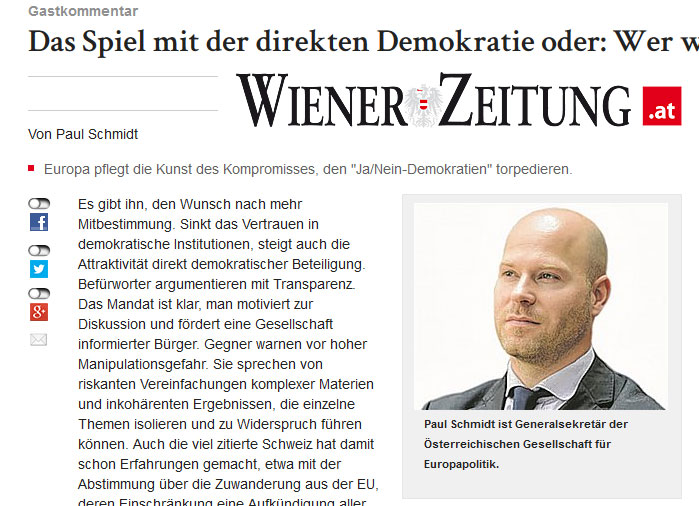Europa pflegt die Kunst des Kompromisses, den “Ja/Nein-Demokratien” torpedieren.
Es gibt ihn, den Wunsch nach mehr Mitbestimmung. Sinkt das Vertrauen in demokratische Institutionen, steigt auch die Attraktivität direkt demokratischer Beteiligung. Befürworter argumentieren mit Transparenz. Das Mandat ist klar, man motiviert zur Diskussion und fördert eine Gesellschaft informierter Bürger. Gegner warnen vor hoher Manipulationsgefahr. Sie sprechen von riskanten Vereinfachungen komplexer Materien und inkohärenten Ergebnissen, die einzelne Themen isolieren und zu Widerspruch führen können. Auch die viel zitierte Schweiz hat damit schon Erfahrungen gemacht, etwa mit der Abstimmung über die Zuwanderung aus der EU, deren Einschränkung eine Aufkündigung aller bilateralen Verträge und damit massive wirtschaftliche Folgen nach sich gezogen hätte. Der Brexit hat ebenfalls eher abschreckende Wirkung. Paradox, wenn Nationalisten einen EU-Austritt propagieren, aber keinen Plan für die Umsetzung haben und dann vor einem politischen wie wirtschaftlichen Scherbenhaufen stehen.
Zukunftsorientiert.
Nur selten gewinnen Regierungen selbst initiierte Referenden. Matteo Renzis Mut – oder eben Torheit -, in Italien über eine Verwaltungsreform abstimmen zu lassen und sein berufliches Schicksal daran zu knüpfen, war da keine Ausnahme. Die tatsächliche Referendumsfrage rückt damit schnell einmal in den Hintergrund. Wobei es historisch auch Beispiele für Niederlagen gibt, die herrschenden Unmut zu einem Thema kanalisierten und dann zu einem anschließenden Wahlsieg führten, etwa Bruno Kreiskys Volksabstimmung zu Zwentendorf.
Die Niederlande wiederum wollten mit einer niedrigeren Schwelle für Volksbefragungen eine vertrauensbildende Maßnahme setzen und erlitten damit ziemlichen Schiffbruch. Von den 32 Prozent, die sich an der unverbindlichen Abstimmung über das rund 2000 Seiten starke EU-Assoziierungsabkommen mit der Ukraine beteiligten, stimmten nämlich 61 Prozent dagegen. Die Zurückhaltung der Regierung, in der Hoffnung, die 30-Prozent-Hürde würde nicht erreicht werden, war dabei wenig hilfreich. Das Hauptmotiv der Ablehnung war insbesondere der gefühlt geringe Einfluss auf die EU und weniger der unlesbare Vertragstext. Das Votum war eine gute Gelegenheit, einfach gegen die Regierungslinie zu stimmen. Der gesamte Ratifizierungsprozess der EU wurde damit blockiert, aufgehalten wurde er nicht.
Ungarns Regierung wollte wiederum via Volksbefragung die Ablehnung der Aufnahme von 1294 Flüchtlingen untermauern und europäische Mehrheitsbeschlüsse torpedieren. Allein dafür wurden 50 Millionen Euro an Kosten veranschlagt. Allerdings wurde die Mindestbeteiligung von 50 Prozent verfehlt. Trotzdem ein Affront gegen jegliche europäische Solidarität.
Direkte Demokratie kann eine Chance sein und ist wichtig. Aber es ist eine Frage von Augenmaß und Dosis. Die inhärente Schwäche der direkten Demokratie öffnet politischer Instrumentalisierung Tür und Tor und kann zu ungewollten Folgen und Dynamiken führen. Die EU bietet Raum für Verhandlungen und Kompromisse, um eine gemeinsame Politik zu formulieren. Nationale Ja/Nein-Abstimmungen verunmöglichen diese Mechanismen.
Weitere interessante Artikel
23. Juli 2024
Krone TV “Nachgefragt”: Wichtige Wahl für EU – Harris gegen Trump
Paul Schmidt spricht im Krone TV-Interview über die Bedeutung des US-Wahlkampfs für die EU, die Sicht der Europäischen Union auf Ungarns aktuelle Ratspräsidentschaft und die Prioritäten der wiedergewählten Ursula von der Leyen.
22. Juli 2024
Puls24 NEWS: EU-Parlament kommt erstmals seit Wahl zusammen
Paul Schmidt, Generalsekretär der österreichischen Gesellschaft für Europapolitik, spricht im Puls24 NEWS Interview über die erste Sitzung des EU-Parlaments nach der EU-Wahl im Juni. Als mögliche Themen werden die Neubesetzung zahlreicher Spitzenjobs und der Ratsvorsitz Ungarns erwartet.
11. Juli 2024
The European Union in Search of Its Own Mythology
By: Olena Pokotilo
The attractiveness of the European Union is based on its economic and social model as well as on its manifold national cultural heritage. Throughout the post-Cold War period, the EU has not actively promoted pan-European myths and struggles today with creating a cohesive and credible common narrative. In this context, the author of this Policy Brief argues that to maintain its unity amidst global instability and evolving political landscapes, the EU must develop new, meaningful myths. She discusses the characteristics of the myth-design of the Union and offers policy recommendations.
The attractiveness of the European Union is based on its economic and social model as well as on its manifold national cultural heritage. Throughout the post-Cold War period, the EU has not actively promoted pan-European myths and struggles today with creating a cohesive and credible common narrative. In this context, the author of this Policy Brief argues that to maintain its unity amidst global instability and evolving political landscapes, the EU must develop new, meaningful myths. She discusses the characteristics of the myth-design of the Union and offers policy recommendations.
Neueste Beiträge
Weitere interessante Artikel
23. Juli 2024
Krone TV “Nachgefragt”: Wichtige Wahl für EU – Harris gegen Trump
Paul Schmidt spricht im Krone TV-Interview über die Bedeutung des US-Wahlkampfs für die EU, die Sicht der Europäischen Union auf Ungarns aktuelle Ratspräsidentschaft und die Prioritäten der wiedergewählten Ursula von der Leyen.
22. Juli 2024
Puls24 NEWS: EU-Parlament kommt erstmals seit Wahl zusammen
Paul Schmidt, Generalsekretär der österreichischen Gesellschaft für Europapolitik, spricht im Puls24 NEWS Interview über die erste Sitzung des EU-Parlaments nach der EU-Wahl im Juni. Als mögliche Themen werden die Neubesetzung zahlreicher Spitzenjobs und der Ratsvorsitz Ungarns erwartet.
11. Juli 2024
The European Union in Search of Its Own Mythology
By: Olena Pokotilo
The attractiveness of the European Union is based on its economic and social model as well as on its manifold national cultural heritage. Throughout the post-Cold War period, the EU has not actively promoted pan-European myths and struggles today with creating a cohesive and credible common narrative. In this context, the author of this Policy Brief argues that to maintain its unity amidst global instability and evolving political landscapes, the EU must develop new, meaningful myths. She discusses the characteristics of the myth-design of the Union and offers policy recommendations.
The attractiveness of the European Union is based on its economic and social model as well as on its manifold national cultural heritage. Throughout the post-Cold War period, the EU has not actively promoted pan-European myths and struggles today with creating a cohesive and credible common narrative. In this context, the author of this Policy Brief argues that to maintain its unity amidst global instability and evolving political landscapes, the EU must develop new, meaningful myths. She discusses the characteristics of the myth-design of the Union and offers policy recommendations.






